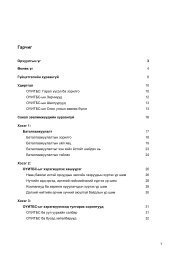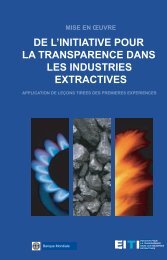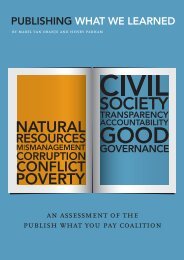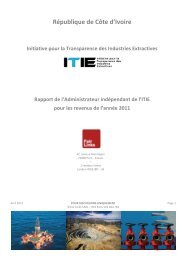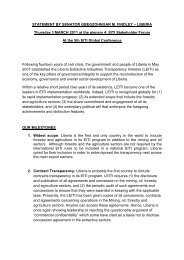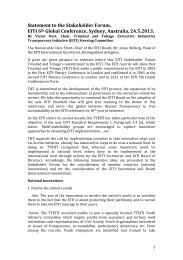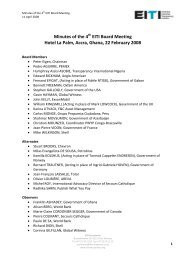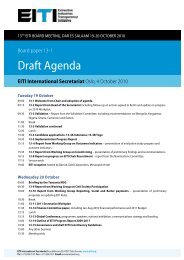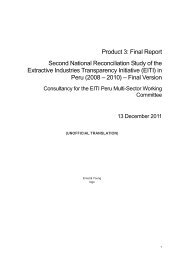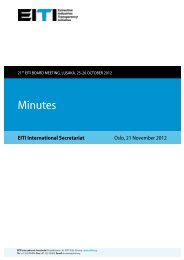Vietnam feasibility study - EITI
Vietnam feasibility study - EITI
Vietnam feasibility study - EITI
You also want an ePaper? Increase the reach of your titles
YUMPU automatically turns print PDFs into web optimized ePapers that Google loves.
52<br />
<strong>EITI</strong> and lobbying <strong>Vietnam</strong> to implement the Initiative, the Royal Norwegian Embassy has been<br />
approaching the MOIT since the beginning of this period. Others have been interested in this issue, like<br />
the Revenue Watch Institute (RWI) who has given both financial and technical support to some local<br />
NGOs. By 12/2010, MOIT and the Royal Norwegian Embassy co-organized a workshop to introduce<br />
the <strong>EITI</strong> to various stakeholders in the extractive industry. A few domestic civil society organizations<br />
initially promoted the <strong>EITI</strong> in <strong>Vietnam</strong>, including Consultancy on Development (CODE) and People<br />
and Nature Reconciliation (Pan Nature) since 2008. However, all of these activities are just the very first<br />
steps and many more things need to be done in the coming time.<br />
v.2 - THe eITI PrIncIPles<br />
At the Lancaster House Conference in June 2003, the <strong>EITI</strong> international secretariat agreed to provide<br />
12 <strong>EITI</strong> principles, including:<br />
1. We share a belief that the prudent use of natural resource wealth should be an important<br />
engine for sustainable economic growth that contributes to sustainable development and<br />
poverty reduction, but if not managed properly, can create negative economic and social<br />
impacts.<br />
2. We affirm that management of natural resource wealth for the benefit of a country’s citizens<br />
is in the domain of sovereign governments to be exercised in the interests of their national<br />
development.<br />
3. We recognize that the benefits of resource extraction occur as revenue streams over many<br />
years and can be highly price dependent.<br />
4. We recognize that a public understanding of government revenues and expenditure over<br />
time could help public debate and inform choice of appropriate and realistic options for<br />
sustainable development.<br />
5. We underline the importance of transparency by governments and companies in<br />
the extractive industries and the need to enhance public financial management and<br />
accountability.<br />
6. We recognize that achievement of greater transparency must be set in the context of<br />
respect for contracts and laws.<br />
7. We recognize the enhanced environment for domestic and foreign direct investment that<br />
financial transparency may bring.<br />
8. We believe in the principle and practice of accountability by government to all citizens for<br />
the stewardship of revenue streams and public expenditure.<br />
9. We are committed to encouraging high standards of transparency and accountability in<br />
public life, government operations, and in business.<br />
10. We believe that a broadly consistent and workable approach to the disclosure of payments<br />
and revenues is required, which is simple to undertake and use.<br />
11. We believe that payments’ disclosure in a given country should involve all extractive<br />
industry companies operating in that country.<br />
12. In seeking solutions, we believe that all stakeholders have important and relevant<br />
contributions to make—including governments and agencies, extractive industry<br />
companies, service companies, multilateral organizations, financial organizations, investors,<br />
and nongovernmental organizations.<br />
The Extractive Industries Transparency Initiative and the Implementation Perspective of <strong>Vietnam</strong>



